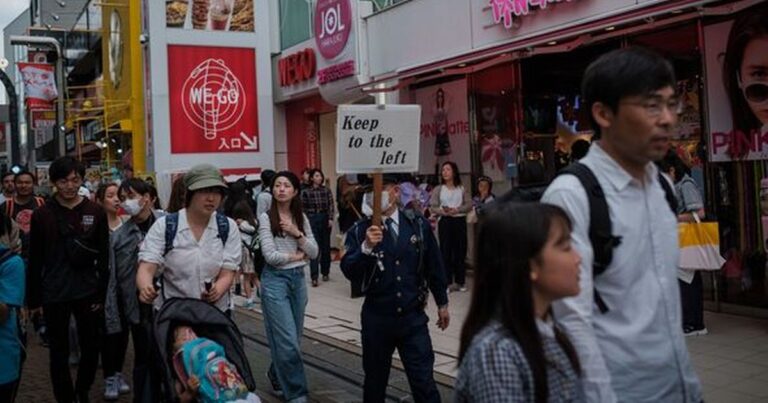While Japanese authorities have taken measures to curb a surge in tourists following the pandemic, some locals are taking action themselves, with reports of tourists being targeted.
A police officer holds a sign asking people to move out of the way (Getty)
One of the world’s top tourist destinations is struggling with a post-pandemic tourism boom, sparking tensions with locals.
Japan is preparing for an unprecedented influx of 33 million foreign tourists in 2024, a 30 percent increase from last year. Japan is known for its hospitality, but residents of popular destinations are feeling the strain of overtourism, and authorities are taking measures to manage the crowds.
For example, new restrictions and fees have been imposed on climbing Mount Fuji, and in Kyoto screens have been installed to restrict photography at certain monuments to prevent overcrowding and accidents. Most critics of overtourism call for greater safeguards in the area, but tensions have occasionally flared. Social media reports have shown instances of clashes between locals and foreigners at train stations, and authorities are trying to ensure that both tourists and residents can enjoy Japan peacefully.
One such initiative is the introduction of a tourist-only bus service by Kyoto city aimed at reducing pressure on local buses, with stops at popular spots like Kiyomizu-dera Temple, Ginkaku-ji Temple, and the Gion area.As the Express reports, new regulations are set to come into effect this spring in Gion, Japan, all to protect the traditional geisha and maiko (teenage apprentices).
Japan sees huge increase in tourists (Getty)
The geisha, dressed in elaborate kimonos and lavish costumes, and the traditional tea shops nearby have always attracted tourists, but concerns have grown in recent years that tourists are harassing the women and trespassing on private property, despite clear warning signs warning people to show respect and not take photos of the women without their permission.
“We plan to put up signs in April telling tourists not to trespass on private roads,” a district representative told the AP. The warnings will be in both Japanese and English, and state that trespassing on private roads carries a fine of 10,000 yen (about £49 at current rates). Similarly, Tokyo’s Shibuya ward is introducing new restrictions on drinking in public.
Starting in October, drinking alcohol outdoors or on public roads will be prohibited between 6 pm and 5 am. Mayor Hasebe Ken, who introduced the new regulations, made it clear that they are not a total ban on drinking, saying, “By imposing these regulations, we want to convey the ward’s intention that people should enjoy drinking inside restaurants, including during patrols.”
Authorities issued a statement following the announcement, warning of the harmful effects of overtourism. They stressed that the “damage caused by overtourism” had become “severe,” leading to littering and “altercations” with local residents. While crackdowns have been carried out in problem areas, the country has said it wants to welcome tourists in other ways.
The USCIS recently unveiled plans to offer digital nomad visas to citizens of around 50 countries, including the US, for six months, a significant extension of the previous 80-day limit.

